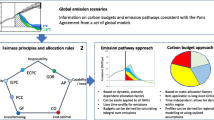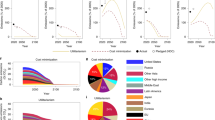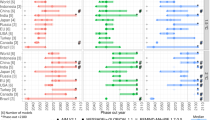Abstract
The Triptych approach is a sectoral approach for differentiation of quantitative greenhouse gas emission reduction objectives. In this study we investigate the ranges in emission reduction targets that result from differences in valueladen assumptions and uncertainties in input data and parameters. In order to assess the effect of highly valueladen assumptions on resulting objectives we used two approaches. First we performed a sensitivity analysis. Then we elaborated the approach from four ideal-typical value-orientations: the administrator, the businessman, the campaigner and the survivor. For each of these value-orientations we specified corresponding sets of assumptions of highly valueladen parameters. Within each set, we also assessed uncertainties for the remaining parameters and input data. We assessed the strength and we quantified their inexactnesses with probability distribution functions. Next, we carried out Monte Carlo simulations in each of the four value-orientations to quantify error propagation from the inexactnesses in input data and parameters. We found targets for the year 2015 for Annex I countries differed up to around 20%-points over the four value-orientations. For developing countries differences in allowances were found up to the order of four. In addition, results are affected to a large extent by uncertainties in the other input data and parameters. Ranges in the outcome resulting from uncertainties are between 10 and 35%-points for Annex I countries, depending on the value-orientation chosen and between 20 and 120%-points for non-Annex I countries. However, the ranking of countries within the calculated differentiation remains roughly the same, an exception being the ranking that resulted from the businessman’s perspective. Other consistent combinations of valueladen assumptions may result in objectives that are outside the range that we based on the four value-orientations. We concluded that care should be taken when assessing valueloading in calculations schemes for emissions objectives based on a limited number of value-orientations only. Our analysis clearly underlines the relevance of making explicit policy variables in schemes for the differentiation of commitments. It is necessary to reach consensus on these variables if such schemes are to support negotiations on greenhouse gas emissions allowances.
Similar content being viewed by others
References
Baer, P.: 1998, “Cultural Theory” and its Application in Environmental Risk Perception. Working paper. Energy and Resources Group, University of California, Berkeley.
Baumert, K. A., Bhandar, R., and Kete, N.: 1999, What might a developing country climate commitment look like?, World Resources Institute, Washington, DC.
Berk, M., Hisschemöller, M., Mol, T., Hordijk, L., Kok, M., and Metz, B.: 2001, Strategieën voor langetermijn klimaatbeleid, de resultaten van het COOL-project, Nationaal Programma Mondiale Luchtverontreiniging en Klimaatverandering (NOP-II), Bilthoven, The Netherlands.
Blanchard, O., Criqui, C., Trommetter, M., and Vinguier, L.: 2001, Equity and Efficiency in Climate Change Negotiations: A Scenario for World Emission Entitlements by 2030, Cahier de Recherche No. 26, Institut d’economie et de politique de l’energie (IEPE), Grenoble, France.
Blok, K., Phylipsen, G. J. M., and Bode, J. W.: 1997, The Triptique Approach. Burden Differentiation of CO2 Emission Reduction Among European Union Member States, Utrecht University, Department of Science, Technology and Society, Zeist, The Netherlands.
Banuri, T., Göran-Mäler, K., Grubb, M., Jacobson, H. K., and Yamin, F.: 1996, ‘Equity and social considerations’, in Bruce, J. P., Lee, H., and Haites, E. F. (eds.), Climate Change 1995 – Economic and Social Dimensions of Climate Change, Contribution of Working Group III to the Second Assessment Report, Cambridge University Press, Cambridge.
Boholm, A.: 1996, ‘Risk perception and social anthropology: Critique of cultural theory’, Ethnos 61, 64–84.
Boyle, R. P. and Coughlin, R. M.:1994, ‘Conceptualizing and operationalizing cultural theory’, in Coyle, D. J. and Ellis, R. J. (eds.), Politics, Policy and Culture, Westview Press, Boulder.
den Elzen, M. G. J., Berk, M. M., Both, S., and Metz, B.: 2000, FAIR 1.0 (Framework to Assess International Regimes for differentiation of commitments): An interactive model to explore options for differentiation of future commitments in international climate policy making, National Institute for Public Health and the Environment, Bilthoven, The Netherlands.
Douglas, M.: 1982, Essays in the Sociology of Perception, Routledge & Kegan Paul Ltd., London, Boston and Henley.
Funtowicz, S. O. and Ravetz, J. R.: 1990, Uncertainty and Quality in Science for Policy, Kluwer Academic Publishers, Dordrecht, The Netherlands.
Groenenberg, H.: 2002, Development and Convergence. A Bottom-Up Analysis for the Differentiation of Commitments under the Climate Convention. Thesis. Utrecht University, Utrecht, The Netherlands.
Groenenberg, H., Blok, K., and van der Sluijs, J. P.: 2005, ‘Global Triptych: A bottom-up approach for the differentiation of commitments under the Climate Convention’, Climate Policy 4, 153–175.
Groenenberg, H., Phylipsen, D., and Blok, K.: 2001: ‘Differentiating commitments world wide: Global differentiation of GHG emissions reductions based on the Triptych approach – A preliminary assessment’, Energy Policy 29, 1007–1030.
Gupta, J.: 1999, ‘North–South aspects of the climate change issue: Towards a constructive negotiating package for developing countries’, Reciel 8, 198–208.
Gupta, J., van der Werff, P., Gagnon-Lebrun, F., and van Dijk, I.: 2001, Bridging Interest, Classification and Technology Gaps in the Climate Change Regime, IVAM Environmental Research UvA BV and Institute of Environmental Sciences, Free University, Amsterdam.
Houghton, J. T., Meira Filho, L. G., Lim, B., Treanton, K., Mamaty, I., Bonduki, B., Griggs, D. J., and Callender, B. A. (eds.): 1996, Revised 1996 IPCC Guidelines for National Greenhouse Gas Inventories, UK Meteorological Office, Bracknell, United Kingdom.
IEA: 1997a, CO2 Emissions from Fuel Combustion 1972–1995, International Energy Agency, Paris.
IEA: 1997b, Energy Statistics and Balances of Non-OECD Countries 1971–1995, International Energy Agency, Paris.
IEA: 1998, Electricity Information 1997, International Energy Agency, Paris.
IMAGE team: 2001, The IMAGE 2.2 implementation of the SRES scenarios: A Comprehensive Analysis of Emissions, Climate Change and Impacts in the 21st Century, National Institute for Public Health and the Environment, Bilthoven, The Netherlands.
Keilman, N.: 1997, ‘Ex-post errors in official population forecasts in industrialized countries’, J. Official Statistics 13, 245–277.
Lutz, W.: 1996, The Future Population of the World: What Can We Assume Today? 2nd edition, Earthscan, London.
Meyer, A.: 2000, Contraction & Convergence. The Global Solution to Climate Change, Green Books, Bristol, United Kingdom.
Morgan, M. G. and Henrion, M.: 1990, Uncertainty, a Guide to Dealing with Uncertainty in Quantitative Risk and Policy Analysis, Cambridge University Press, Cambridge.
Müller, B.: 2001, ‘Varieties of distributive justice in climate change’, Climatic Change 48, 273–288.
Nakićenović, N. et al. (eds.): 2000, Special Report on Emissions Scenarios, Cambridge University Press, Cambridge.
Olivier, J. G. J., Bouwman, A. F., van der Maas, C. W. M., Berdowski, J. J. M., Veldt, C., Bloos, J. P. J., Visschedijk, A. J. H., Zandveld, P. Y. J., and Haverlag, J. L.: 1996, Description of EDGAR Version 2.0: A set of global emission inventories of greenhouse gases and ozone-depleting substances for all anthropogenic and most natural sources on a per country bases on 1°×1° grid, National Institute of Public Health and the Environment, Bilthoven, The Netherlands.
Philibert, C.: 2001a, ‘Evolution of mitigation commitments: Certainly versus stringency’, International Energy Agency, Vienna.
Philibert, C.: 2001b, ‘Evolution of mitigation commitments: Fixed targets versus more flexible architectures’, International Energy Agency, Vienna.
Philibert, C. and Pershing, J.: 2001, ‘Considering the options: Climate targets for all countries’, Climate Policy 1, 211–227.
Phylipsen, G. J. M., Bode, J. W., Blok, K., Merkus, H., and Metz, B.: 1998, ‘A Triptych sectoral approach to burden differentiation; GHG emissions in the European bubble’, Energy Policy 26, 929–943.
Ravetz, J. R.: 2001, ‘Models of risks: An exploration’, in Dunn W. N., Hisschemoller, M., Hoppe, R., and Ravetz, J. R. (eds.), Knowledge, Power, and Participation in Environmental Policy Analysis, Special Issue Policy Studies Review Annual, pp. 471–492.
Ringius, L.: 1999, ‘Differentiation, leaders, and fairness: Negotiating climate commitments in the European Community’, International Negotiations 4, 133–166.
Ringius, L., Torvanger, A., and Underdal, A.: 2000, Burden Differentiation: fairness Principles and Proposals: The Joint CICERO-ECN Project on Sharing the Burden of Greenhouse Gas Reduction Among Countries, Energy research Centre of the Netherlands, Petten and Centre for International Climate and Environmental Research – Oslo.
Ringius, L., Torvanger, A., and Underdal, A.: 2002, ‘Burden sharing and fairness principles in international climate policy’, International Environmental Agreements: Politics, Law and Economics 2, 1–22.
Risbey, J., Van der Sluijs, J. P., and Ravetz, J.: 2001, A protocol for assessment of uncertainty and strength of emissions data, Department of Science, Technology and Society, Utrecht University, Utrecht, The Netherlands.
Rose, A.: 1992, ‘Equity considerations of tradeable carbon emission entitlements’, in Combating Global Warming. Study on a Global System of Tradeable Carbon Emission Entitlements, United Nations Conference on Trade and Development, New York.
Rotmans, J. and de Vries, B. (eds.): 1997, Perspsectives on Global Change: The TARGETS Approach, Cambridge University Press, Cambridge.
Schwarz, M. and Thompson, M.: 1990, Divided We Stand. Redefining Politics, Technology and Social Choice, Harvester Wheatsheaf, New York.
Sijm, J., Jansen, J., and Torvanger, A.: 2001, ‘Differentiation of mitigation commitments: The multi-Sector convergence approach’, Climate Policy 1, 481–497.
Sjöberg, L.: 1997, ‘Explaining risk perception: An empirical evaluation of cultural theory’, Risk Decision and Policy 2, 113–130.
Van der Sluijs, J. and Kloprogge, P.: 2001, ‘The inclusion of stakeholder perspectives in integrated assessment of climate change,’ in Decker, J. (ed.), Interdisciplinarity in technoogy assessment. Implementations and their chances and limits. Series: “Wissenschaftsethik un technikfolgenbeurteiling”, Vol. 11, pp. 199–214, Springer, Berlin Heidelberg, New York.
Van der Sluijs, J. P.: 2001, ‘Integrated assessment models and the participatory challenge. The case of climate change’, in Dunn W. N., Hisschemoller, M., Hoppe, R., and Ravetz, J. R. (eds.), Knowledge, Power, and Participation in Environmental Policy Analysis, special issue Policy Studies Review Annual, pp. 317–348.
Van der Sluijs, J. P., Hisschemoller, M., de Boer, J., and Kloprogge, P.: 2002, ‘Climate risk assessment, evaluation of approaches’, Summary and synthesis report. NRP report, Utrecht University.
Stirling, A. and Mayer, S.: 2001, ‘A novel approach to the appraisal of technological risk: A multicriteria mapping study of a genetically modified crop’, Environment and Planning C: Government and Policy 19, 529–555.
Thompson, M., Ellis, R., and Wildavsky, A.: 1990, Cultural Theory, Westview Press, Boulder, San Francisco and Oxford.
Trisoglio, A.: 1995, Plurality and Political Culture: A Response to Thompson and Drake, paper presented at workshop “Risk, Policy and Complexity”, 7–9 August 1995, IIASA, Laxenburg.
Turkenburg, W. C. and van der Sluijs, J. P.: 2000, Review van het RIVM instrumentarium voor de totstandkoming van lange termijn prognoses met betrekking tot de emissies van broeikasgassen, Department of Science, Technology and Society, Utrecht, The Netherlands.
UN: 1998, World Population Projections to 2150, United Nations Department of Economic and Social Affairs Populations Division, New York.
WEC: 1995, Energy Efficiency Improvement Utilising High Technology. An Assessment of Energy Use in Industry and Buildings, World Energy Council, London.
Author information
Authors and Affiliations
Corresponding author
Rights and permissions
About this article
Cite this article
Groenenberg, H., Sluijs, J.V.D. Valueloading And Uncertainty In A Sector-based Differentiation Scheme For Emission Allowances. Climatic Change 71, 75–115 (2005). https://doi.org/10.1007/s10584-005-5376-7
Received:
Revised:
Issue Date:
DOI: https://doi.org/10.1007/s10584-005-5376-7




